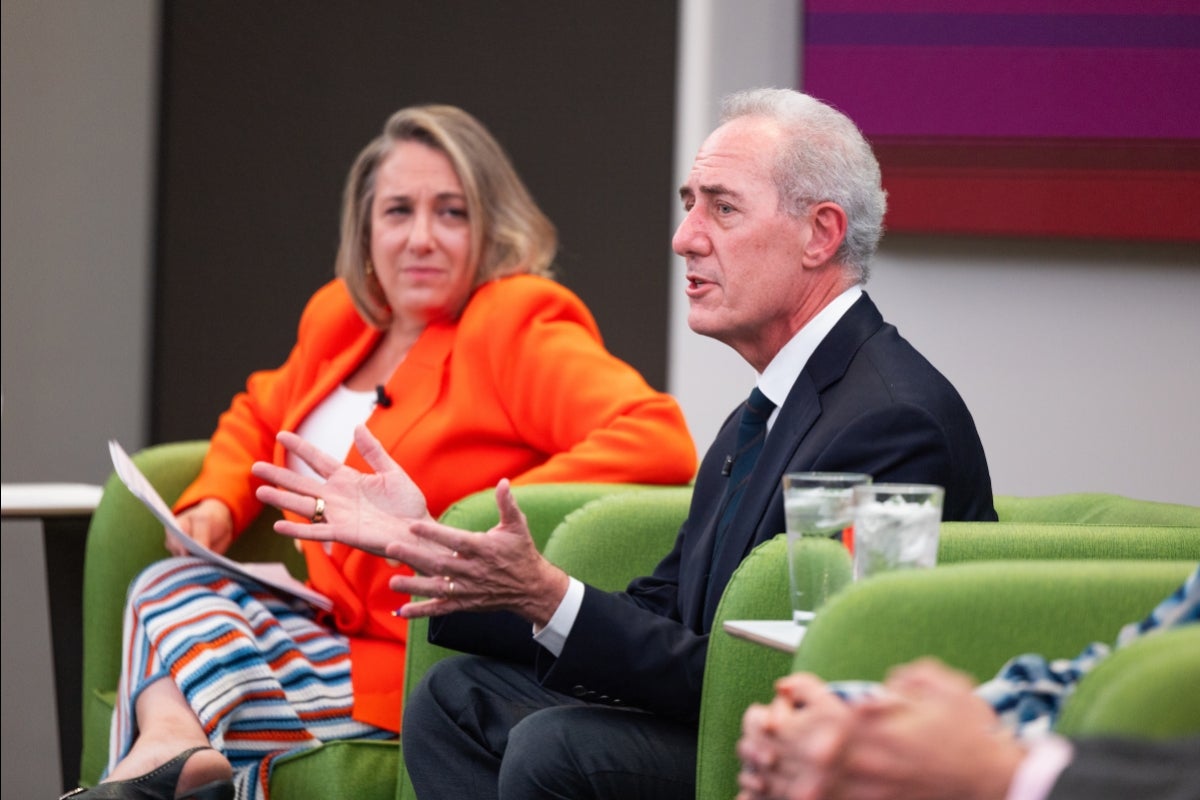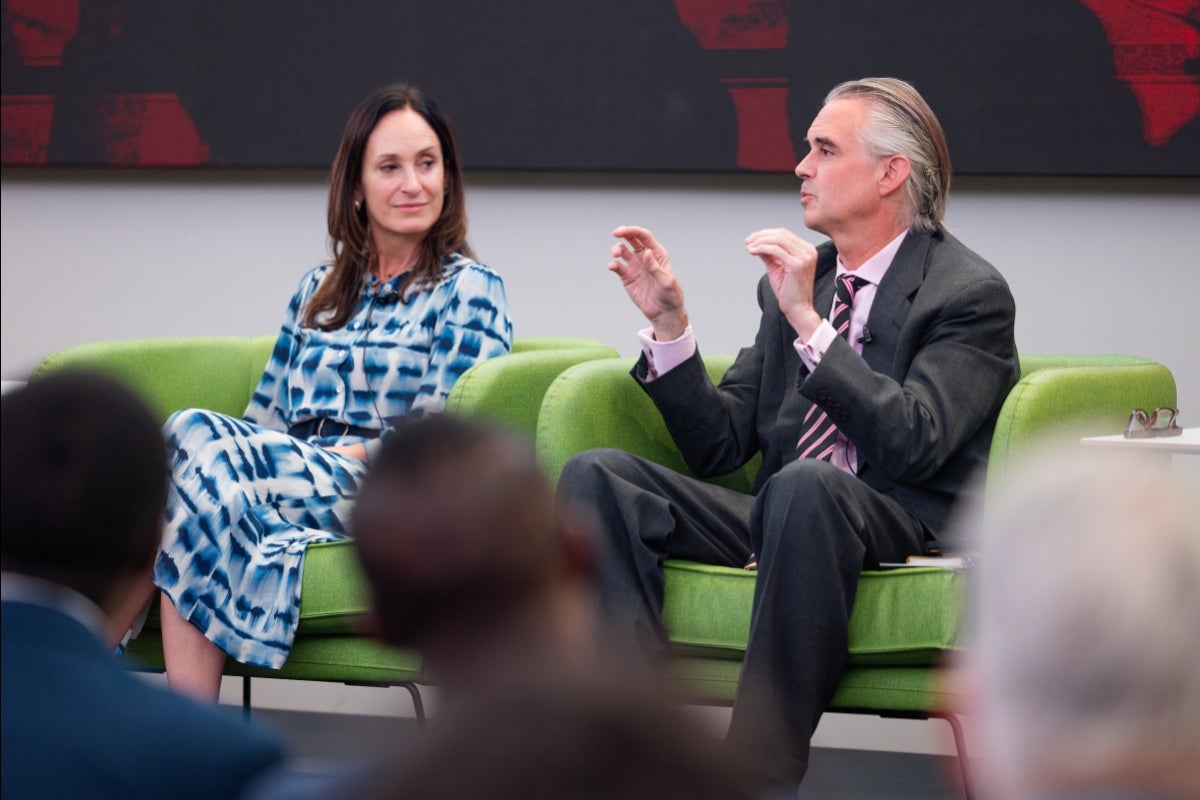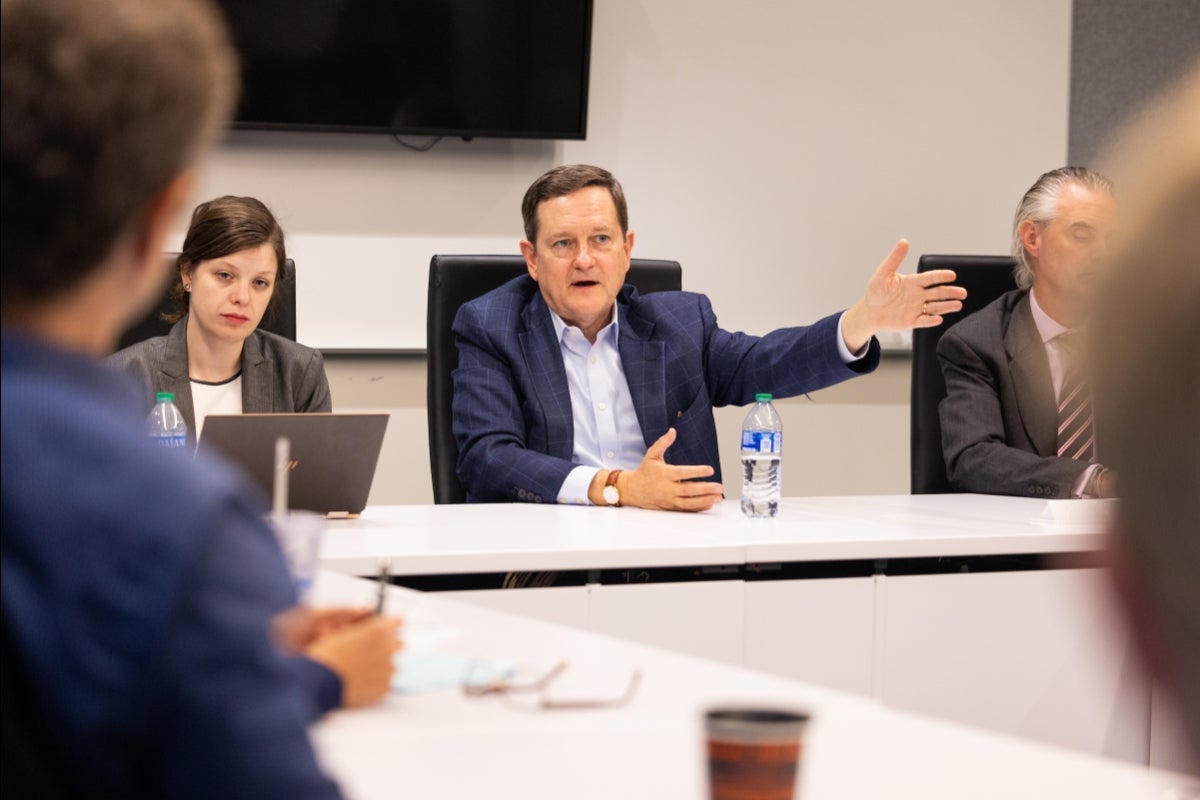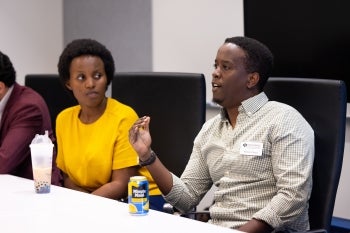Foreign policy experts see Arizona as pivotal on world stage

The Council on Foreign Relations think tank held a U.S. Foreign Policy Public Forum on Wednesday at the Thunderbird School of Global Management at ASU's Downtown Phoenix campus. Photo by Samantha Chow/ASU News
America’s relationship with other countries is in flux right now, and Arizona, with its booming economy, is a perfect example of how foreign policy is inextricably tied to domestic issues, according to a panel of experts who spoke at Arizona State University on Wednesday.
“We have wars in the Middle East, in Europe and Africa and other places. We have an unprecedented competition between China and not just the U.S. but other countries as well, with military, political, economic, technological issues,” said Michael Froman, president of the Council on Foreign Relations.
“We've got issues like pandemics and climate change that cut across borders and require international cooperation. And yet the mechanisms of international cooperation are probably more strained and more limited and the institutions in more need of reform than ever before.”
Froman was part of a panel discussion on U.S. foreign policy that was sponsored by the Council on Foreign Relations, a nonpartisan think tank, and held at the Thunderbird School of Global Management at the Downtown Phoenix campus.
“Arizona is a great example in just how much of its economic well-being is tied in to the rest of the world,” said Froman, who mentioned that the state is No. 1 in international investment and that Mexico is the state’s largest trading partner.
Shannon O’Neil, senior vice president of the Council on Foreign Relations, is an expert on Mexico. She thinks the country’s new president, Claudia Sheinbaum, needs to invest in infrastructure that will boost trade — such as clean energy, railways, highways, airports and ports — and work with the new U.S. administration next year.
“She has a moment for a reset, and it can improve the economy and improve security,” she said.
The narrative that China became a global economic powerhouse because of cheap labor is an oversimplification, according to Doug Guthrie, a professor and director of China initiatives at Thunderbird. He was a senior director for Apple in China for several years.
“China has built the most sophisticated manufacturing supply chain in the world, by a lot,” he said, noting that Apple works with more than a thousand factories in China.
If tensions were to become very strained, such as by Taiwan declaring independence, American corporations that are deeply embedded in China — such as Apple, Walmart and Tesla — could be forced to leave, which would be economically devastating, Guthrie said.
“U.S.–China relations are at a critical point, and Phoenix is in a critical place because of Taiwan’s investment (in the TSMC microchip plant) and the potential tension of that,” he said.
Guthrie said that encouraging open dialogue at every level is key to easing those tensions, and he praised the Phoenix Sister Cities partnerships with Taipei and Chengdu.
“We have to get people to the table,” he said. “I think policy should not be just left to the politicians.”
The ASU visit by the Council on Foreign Relations is part of a nationwide tour of swing states before the Nov. 5 election. The experts encouraged the crowd to think about the candidates’ positions on foreign policy issues such as tariffs.
The $300 billion in tariffs that were placed on Chinese goods by the Trump administration, and kept in place by the Biden administration, have mostly burdened American consumers — especially Walmart customers, Guthrie said.
“China is not the one getting taxed,” he said.
Froman said he’s seen more sentiment toward isolationism.
“It was previously here in the U.S. in the 1930s after the first World War and it’s back,” he said.
“One view is, ‘Why are we engaged internationally when we have so many problems here? Why send money to Ukraine when we don’t have enough money to pay for hurricane relief in the U.S.?’
“The other version, which is somewhat more complicated, is, ‘Why are we involved, for example, in Ukraine when the existential issue for the U.S. is China? Let’s leave Ukraine for the Europeans and let’s focus 100% of our effort on detaining China from invading Taiwan.’
“But the U.S. needs to be engaged everywhere.”
Before the evening forum, several Thunderbird at ASU students discussed foreign policy with Matthew Goodman, director of the council’s new RealEcon Initiative, which seeks to gauge America’s global economic influence.
Goodman challenged the students to think about the give-and-take of trade policy and whether the U.S. still has enough influence to make demands of countries in exchange for investment, particularly as China ramps up its presence in Africa and South America.
Jeannette Umutoni, who is from Rwanda and is pursuing a master’s in global business, said that the U.S. perspective often views Africa primarily through a lens of charity, overlooking the continent's potential as a business partner.
“The focus tends to lean more toward providing aid rather than fostering mutually beneficial economic partnerships,” she said.
“Africa holds numerous untapped business opportunities that could benefit both sides.”
Umutoni also emphasized the importance of empowering the next generation of African leaders through education, and ensuring they have a seat at the table when discussing foreign policy issues.
Barnabas Ngoga, who is from Rwanda and is pursuing a master’s degree in global management, said that the U.S. needs to reset its relationship with Africa.
“America is the most charitable nation in the world,” he said.
“We’re saying the time has come to look at Africa and developing nations as partners in trade. Africa is no longer as it was in the 1970s or 1960s.”
More Local, national and global affairs

ASU's USAID projects provided economic benefits to US
For more than a decade, Arizona State University has helped people around the world — and advanced interests in the United States at the same time — through its collaborative projects with the U.S.…

ASU champions veterans' success and national security
Arizona State University has a long history of supporting the military — whether through veteran education, groundbreaking research that improves their well-being, or innovative programs that…

ASU named a top producer of faculty, student Fulbright awards for 2024–25
When faculty and students travel abroad on a Fulbright award, they’re often working at the forefront of current events and cultural change.David Androff, a professor in the School of Social Work at…





